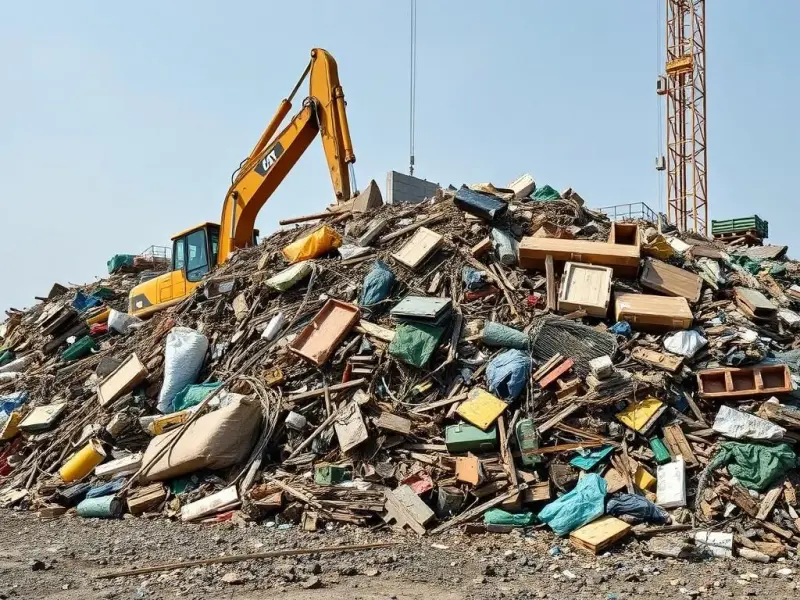Eco-Friendly Solutions for Construction Waste Disposal: How Technology Enhances Sustainable Building
The construction industry significantly impacts the environment, with waste generation being a primary concern. Traditional disposal methods often lead to resource depletion and environmental degradation. However, technological advancements are paving the way for sustainable construction practices, emphasizing efficient waste management and eco-friendly disposal methods.

Understanding Construction Waste
Construction waste encompasses materials generated during building, renovation, and demolition activities. Common components include concrete, wood, metals, glass, and plastics. Improper disposal of these materials can lead to environmental issues such as soil contamination and increased greenhouse gas emissions.
The Importance of Sustainable Waste Management
Implementing sustainable waste management practices is crucial for minimizing environmental impact. By adopting eco-friendly disposal methods, the construction industry can reduce its carbon footprint, conserve natural resources, and promote a circular economy.
Technological Innovations in Waste Management
Recent technological advancements have introduced innovative solutions for managing construction waste:
-
Smart Waste Bins: Equipped with sensors, these bins monitor waste levels and optimize collection schedules, enhancing efficiency and reducing unnecessary pickups.
-
Recycling Technologies: Advanced machinery now enables the recycling of materials like concrete and steel, transforming waste into reusable resources and reducing the need for new raw materials.
-
Waste Converters: These machines treat and recycle solid and liquid refuse, converting waste into usable end products such as biofuel or building materials, thereby minimizing environmental impact.
Eco-Friendly Disposal Methods
Adopting environmentally friendly disposal methods is essential for sustainable construction:
-
On-Site Sorting: Separating waste materials at the source facilitates recycling and reduces contamination, making the recycling process more efficient.
-
Material Reuse: Repurposing materials like bricks and timber in new projects reduces waste and conserves resources.
-
Recycling Initiatives: Implementing programs to recycle materials such as concrete and metals helps divert waste from landfills and supports the production of new construction materials.
Benefits of Sustainable Construction Practices
Embracing sustainable waste management offers numerous advantages:
-
Environmental Preservation: Reduces pollution and conserves natural resources, contributing to a healthier ecosystem.
-
Economic Savings: Decreases disposal costs and can generate revenue through the sale of recycled materials.
-
Regulatory Compliance: Ensures adherence to environmental regulations, avoiding potential fines and enhancing corporate reputation.
Challenges and Future Outlook
Despite the benefits, challenges such as high initial costs and the need for industry-wide education persist. However, ongoing technological advancements and increasing environmental awareness are driving the construction industry toward more sustainable practices.
Emerging Trends in Sustainable Construction Waste Management
As the construction industry embraces sustainability, several emerging trends are transforming how waste is managed and disposed of. These trends not only address current challenges but also pave the way for more innovative practices in the future.
1. Blockchain for Waste Tracking
Blockchain technology is revolutionizing the way waste management is monitored and recorded. By providing an immutable record of waste generation, transportation, and disposal, blockchain ensures transparency and accountability. Construction companies can use blockchain to verify that waste is being handled according to regulatory standards and to identify opportunities for improvement in their waste management processes.
2. Modular Construction to Reduce Waste
Modular construction is gaining popularity as a method to minimize waste generation at construction sites. By prefabricating building components in controlled environments, this approach reduces errors, material wastage, and the environmental footprint of traditional on-site construction methods. Modular construction also allows for easier reuse and recycling of materials, as components can be disassembled and repurposed with minimal waste.
3. Urban Mining for Material Recovery
Urban mining is a concept that involves extracting reusable materials from existing infrastructure and demolition sites. By treating cities as "mines," this practice focuses on recovering valuable resources such as metals, concrete, and even glass from old buildings and roads. Urban mining reduces the need for virgin materials and helps conserve natural resources.
4. 3D Printing in Construction
3D printing is emerging as a game-changer in the construction industry. This technology allows for precise material usage, significantly reducing waste. Furthermore, 3D printing enables the use of recycled materials in construction projects, turning waste into building components such as walls, floors, and furniture. This not only minimizes environmental impact but also supports the circular economy.
5. Bio-based Materials and Biodegradable Alternatives
The development of bio-based construction materials is addressing the environmental impact of traditional materials. Products such as hempcrete, mycelium-based composites, and biodegradable plastics offer sustainable alternatives that decompose naturally, reducing long-term waste accumulation. These materials are increasingly being used in green building projects to promote eco-friendly practices.
6. Education and Training in Waste Management
A growing focus on education and training is empowering construction professionals to adopt sustainable practices. Workshops, certifications, and digital platforms are being developed to provide in-depth knowledge about waste reduction techniques, innovative disposal methods, and the benefits of recycling. By building awareness, the industry can overcome resistance to change and accelerate the adoption of eco-friendly practices.
7. Government Incentives and Policies
Governments worldwide are implementing incentives to encourage sustainable construction practices. Subsidies, tax benefits, and grants are being offered to companies that prioritize waste reduction and recycling. Additionally, stricter regulations are being introduced to ensure compliance with environmental standards. These measures are driving the industry to invest in sustainable technologies and innovative waste management solutions.
8. Zero-Waste Construction Sites
The concept of zero-waste construction sites is gaining traction. These sites aim to divert 100% of their waste away from landfills by prioritizing recycling, repurposing, and composting. Innovative site management practices, such as real-time waste tracking and collaborative planning with suppliers, are helping achieve this ambitious goal.
Conclusion: Shaping a Sustainable Future
The construction industry is at a turning point where sustainability is not just an option but a necessity. The integration of advanced technologies, innovative practices, and collaborative efforts is reshaping how waste is managed. By staying ahead of these trends and committing to eco-friendly solutions, the construction sector can significantly contribute to global sustainability goals, ensuring a greener future for generations to come.
Articles
Register for our notifications and have the newest and most intriguing articles sent directly to your email.